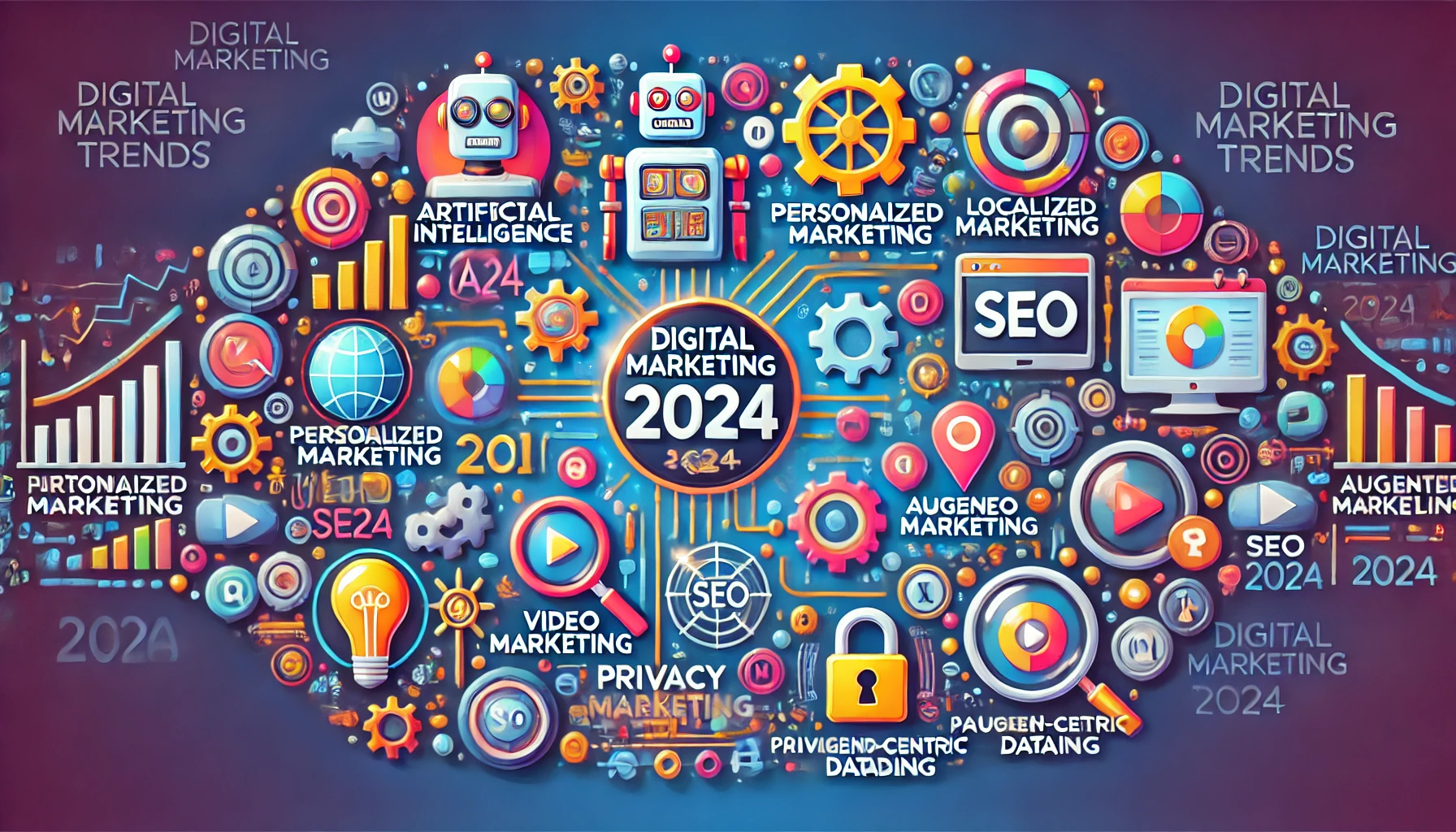Digital marketing trends constantly evolve, and staying updated with the latest trends is crucial for marketers looking to maintain a competitive edge. In 2024, several key trends are set to shape the landscape, driven by technological advancements and changing consumer behaviors.
Exploring the Top Digital Marketing Trends of 2024
Digital marketing in 2024 is poised for significant transformation driven by several key trends. Artificial Intelligence (AI) and Machine Learning (ML) are revolutionizing SEO and personalized marketing, enhancing user engagement through real-time adaptation. Video content, particularly live streaming and augmented reality (AR), is becoming more dominant, offering immersive experiences that captivate audiences. Privacy-centric marketing, focusing on transparent data collection and secure handling, is essential as third-party cookies phase out. Additionally, micro-influencers are gaining traction for their authentic and relatable content, which resonates deeply with niche audiences (Digital Marketing Institute) (LocaliQ) (Cyberclick).
Artificial Intelligence and Machine Learning in Marketing
Artificial Intelligence (AI) and Machine Learning (ML) continue to revolutionize digital marketing. These technologies enhance various aspects of marketing, from SEO to personalized customer engagement. Google’s Search Generative Experience (SGE) is a prime example of how AI transforms SEO. SGE uses AI to provide more relevant and comprehensive search results, offering a conversational mode for users to interact with Google more naturally. Marketers need to stay updated with AI advancements, as the technology evolves rapidly and presents new opportunities for optimization and engagement.
AI-driven content creation tools are becoming more sophisticated, enabling marketers to generate personalized content dynamically. This personalization extends to real-time adaptation based on user interactions, providing a highly tailored experience that boosts engagement and conversion rates. As AI continues to improve, marketers need to integrate these tools into their strategies to stay competitive.
User-Centric SEO and High-Quality Content
SEO strategies are shifting towards a more user-centric approach, driven by advancements in AI and ML. Google’s EEAT (Experience, Expertise, Authoritativeness, and Trustworthiness) framework is crucial in this context. EEAT emphasizes the importance of creating high-quality content that reflects real-world experience and expertise, something AI cannot replicate. Marketers should focus on producing content that is not only informative but also engaging and shareable. This approach helps in building trust and authority, essential factors in achieving higher search rankings.
Creating content that stands out in a crowded digital space requires a focus on quality and relevance. High-quality content that resonates with users and encourages sharing is more likely to achieve better search rankings and drive organic traffic. Marketers should continuously refine their content strategies to align with these evolving SEO trends.
Personalized and Localized Marketing Strategies
Personalization in digital marketing is moving towards hyper-personalization, leveraging AI and ML to tailor content to individual user preferences and behaviors in real time. This approach enhances user engagement and fosters deeper connections with the audience. Localized marketing is also gaining importance, with brands creating content and experiences that resonate with specific local demographics. This hyper-local relevance helps in building brand loyalty and engagement at a community level.
Successful localized campaigns often involve partnerships with local influencers, community-driven initiatives, and content that addresses local needs and interests. Marketers should explore ways to integrate these elements into their strategies to create more impactful and relatable marketing efforts.
Video Marketing and Augmented Reality
Video content continues to dominate the digital landscape, with its popularity expected to grow even further in 2024. Live streaming and augmented reality (AR) are key trends in this space, offering immersive and interactive experiences for users. AR allows customers to virtually experience products, significantly enhancing engagement and conversion rates.
Brands are increasingly using video and AR to create compelling stories and interactive experiences that capture the audience’s attention. Case studies of successful video and AR campaigns highlight the effectiveness of these formats in driving user engagement and achieving marketing goals.
Privacy-Centric Marketing and First-Party Data
With the phasing out of third-party cookies, privacy-centric marketing has become essential. Marketers need to prioritize transparent data collection and secure data handling to build consumer trust. Leveraging first-party data, which is inherently more secure, allows for personalized marketing while respecting user privacy.
Ethical data practices and transparency in how data is collected and used are crucial in building and maintaining trust with consumers. Brands that adopt these practices are better positioned to foster long-term customer relationships and achieve sustainable success.
Email Marketing and Digital Messaging
Despite being an older digital marketing strategy, email marketing remains highly effective in 2024. It offers a direct and personal way to engage consumers, and its integration with chatbots and mobile notifications can enhance customer interaction. Effective email campaigns focus on delivering relevant and personalized content, making use of data insights to tailor messages to individual preferences.
Digital messaging, including chatbots and mobile notifications, complements email marketing by providing additional touchpoints for engaging with customers. Together, these strategies create a cohesive and comprehensive communication approach that drives engagement and conversion.
Micro-Influencer Marketing
Influencer marketing is shifting towards micro-influencers, who have smaller but more engaged and loyal followings. These influencers offer authentic and relatable content, which resonates better with audiences compared to content from larger influencers. Collaborating with micro-influencers can yield higher engagement and trust among targeted audiences.
Micro-influencers often have a more personal connection with their followers, making their recommendations more impactful. Brands should consider integrating micro-influencer partnerships into their marketing strategies to leverage this trend effectively.
Conclusion
The digital marketing landscape in 2024 is shaped by technological advancements and changing consumer behaviors. Key trends such as AI and ML, user-centric SEO, personalized and localized marketing, video and AR, privacy-centric marketing, email and digital messaging, and micro-influencer marketing offer significant opportunities for brands to connect with their audiences in meaningful ways. Marketers who stay updated with these trends and adapt their strategies accordingly will be well-positioned for success in the evolving digital landscape. Continuous learning and adaptation are essential in navigating the dynamic world of digital marketing and achieving long-term success.
[ad_2] [products limit=”4″ columns=”4″ category=”software”]